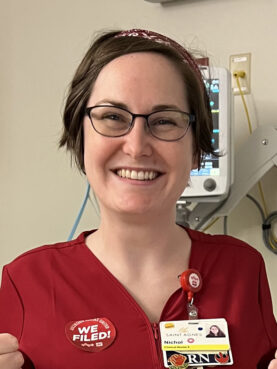Judith Garber, a senior policy analyst at the Lown Institute, a nonpartisan think tank, said Ascension’s investments in health care businesses, including medical debt collection “while hospital services were struggling, shows a lot about their priorities.”
A 2020 report by Community Catalyst, a health care advocacy organization, found that, in general, Medicaid-insured patients make up only 7.2% of discharges at Catholic hospitals, compared to 8.3% at other nonprofit hospitals and 13.6% at public hospitals.
The NNU report stated that at Ascension, charity care accounts for 1.9% of operating expenses, below the 2.6% national average.
Dr. Richard Fogel. (Photo courtesy Ascension)
Ascension did not provide RNS with its charity care percentages, but its administrators disputed the narrative of NNU’s report, calling maternal and perinatal care, especially for poor and vulnerable people, a “cornerstone” of Ascension’s work.
Dr. Richard Fogel, Ascension’s executive vice president and chief clinical officer, said the number of babies born in the company’s hospitals has been relatively stable for the last five years despite declining birth rates, with Ascension delivering about 1-in-50 U.S. babies in 2023.
Fogel said that department closures are made with the goal of providing the best care as they see more high-risk pregnancies and fewer births. “In medicine, it’s a general truth that the more you do as a provider or facility, the better you are, especially when it comes to complex cases,” he said.
Dr. Thomas Aloia, senior vice president and chief medical officer at Ascension, also told RNS that closed units “led to access to better care.”
An Ascension spokesperson said, “Ascension strongly outperforms national averages for all maternal and infant clinical measures, including neonatal mortality. Our outcomes for Black and African American patients are better than the national average.”
But Dr. Jerrelyn J. Inocencio-Diaz, an OB-GYN and a clinical instructor at Kaiser Permanente School of Medicine, told RNS in an email that, while practical in theory, consolidating labor and delivery limits access to care for many patients, who can no longer find beds or appointments or have trouble reaching remaining hospitals.

Dr. Jerrelyn J. Inocencio-Diaz. (Courtesy photo)
“In times of emergency, distance may preclude a patient from accessing timely care which could result in dire consequences,” Inocencio-Diaz wrote.
“Numerous studies have documented racial disparities in obstetric care. This decision will further widen them,” Inocencio-Diaz added. “Consolidating (labor and delivery) services in fewer hospitals with more specialized staff will negatively impact obstetric care in lower socioeconomic communities.”
Closures are not the only problem Ascension nurses have become alarmed about. Several told RNS that they have seen a pattern of reduced services and a lack of information for pregnant patients, new mothers and babies.
Vanessa Villarreal, a NICU nurse at Ascension Seton Medical Center in Austin, Texas, said her hospital recently stopped translating discharge or consent papers into Spanish, now providing them to patients only in English in a city where 30% of residents do not speak English at home. Instead the hospital uses “unreliable” interpretation programs on iPads.
Villarreal also said the system has not done enough to tell patients that there is no labor and delivery at a nearby Ascension medical center. When a mom in pre-term labor mistakenly shows up and gives birth there, two medical teams are needed to transfer the mom and premature baby to further care, separating them. “It’s a traumatic experience,” said Villarreal.
Marvin Ruckle, a NICU nurse who has worked at Via Christi St. Joseph hospital facility in Wichita for more than three decades, said that when Ascension took over in 2013, “they started cutting services,” eliminating even the simplest surgeries in the NICU and sending patients and their parents three hours away for that care.

Nicki Horvat. (Photo courtesy National Nurses United)
Recently, Ruckle said, Ascension cut his NICU’s brain-scanning electroencephalogram services and depends on another hospital’s technicians. Parents and clinicians sometimes wait 10 hours or more to find out if a baby that has stopped breathing temporarily has experienced brain damage.
Nicki Horvat, a NICU nurse at Ascension Saint Agnes Hospital in Baltimore, said that nurses on her unit “very often” have three patients, instead of the recommended two. In the mother-baby unit, where one nurse cares for both patients, Horvat said that nurses haven’t been adequately trained to care for the baby’s and mom’s different needs. Meanwhile, each nurse is assigned four or five pairs — or eight to 10 patients.
“Unfortunately, the people who suffer the most are the babies, because they can’t voice their needs,” Horvat said.
Horvat and Villarreal both said they hoped Catholic leaders would speak up and support the nurses in asking Ascension to fulfill its mission.


